toasting came before hip hop imhoWE
INVENTED
BOTH.
guess what "soundclashes" were?
Play-offs.
Guess what toasting was? Jive Talk, radio slang, and our natural way of being.
nikkas studied and read how to do both...then renamed like vultures.
You are using an out of date browser. It may not display this or other websites correctly.
You should upgrade or use an alternative browser.
You should upgrade or use an alternative browser.
“Hip Hop Came From Dancehall” Topic Came Up On The Breakfast Club
- Thread starter KyokushinKarateMan
- Start date
More options
Who Replied?The foundation of hip hop is ALL black American. Him being Jamaican is basically useless argument really. Nothing about hip hop came from Jamaica.
Another misconception, he's not the godfather of anything, just a record player who was inspired by his American environment and African American peers.
Herc Is the godfather of da culture
This is not debatable so don’t even waste your time trying to address this
with that said … da culture, da music , da energy and all da elements are from black American aka ADOS
KyokushinKarateMan
Train hard, fight easy
Go find a coconut, nikka.
1965
1968
I was just answering his question as to where that assumption came from you real life p*ssy ass nikka.

IllmaticDelta
Veteran
toasting came before hip hop imho
afram jive (1920s)
and slick patter (in this case, by black american radio dj's)

^^jocko...this is who jamaicans were trying to be like in the1950/1960s
is the origin of jamaican toasting and modern day afram rapping

the afram comedians like pigmeat markham took that jive patter and put it over TRUE funk beats in the 1960s
1920s (blues) 1930s (jazz) 1940/1950s (Rhythm & Blues) and 1960s (Soul)/1970s (Funk) all used this jive/patter on records, which gave way to hiphop/rapping (syncopated to the beat) in the 1970s/1980s.
Swahili P'Bitek
Absorbingpovertywithoutlimitations
Go listen to mento and listen to ska then reggae and you"ll find some influences from that music in jamaican roots reggae, actually in parts of English speaking Africa, mento and calypso were already known before they transitioned to ska, then rocksteady to reggae, so I'm not guessing. That's part of the reason roots reggae was so popular in Africa just as with any other genre.What is a "Jamaican" sound? Putting an accent on something doesn't make it a new genre.


It was AMERICAN IN ORIGIN.

I speak more than 2 languages and when somebody is rapping, I can tell, and when they are deejaying, I can also tell, and it's not about putting on a fake jamaican accent or fake burro banton growl.
Dancehall's sound starting in the digital era is 100% jamaican, otherwise it would be called jamaican hip hop/rap lol. Go listen to punanny rhythm, released the same time as Rakim's paid in full and compare the sounds for any similarities as well as how Admiral Bailey treats the beat and Rakim does his thing, they are vastly different experiences. The sounds of those genres are so different, they couldn't be more different even if they tried.
Last edited:
It did but, battling the hip hop way didn’tSo can somebody speak on the accusation that the concept of Verzus come from Dancehall?
All you have to do is use common sense to see the differences
Hip hop battles are based on skills, not actual songs. Dj battles are the same way
And if hip hop came from dancehall why wasn’t hip hop being done in London, Toronto, or Miami in the early 70’s? Jamaicans went to live in these places as well
Jamaica didn't have recorded music until 1947, the US military is 1/3 black, and they've always liked the bluesGo listen to mento and listen to ska then reggae and you"ll find some influences from that music in jamaican roots reggae, actually in parts of English speaking Africa, mento and calypso were already known before they transitioned to ska, then rocksteady to reggae, so I'm not guessing. That's part of the reason roots reggae was so popular in Africa just as with any other genre.
I speak more than 2 languages and when somebody is rapping, I can tell, and when they are deejaying, I can also tell, and it's not about putting on a fake jamaican accent or fake burro banton growl.
Dancehall's sound starting in the digital era is 100% jamaican, otherwise it would be called jamaican hip hop/rap lol. Go listen to punanny rhythm, released the same time as Rakim's paid in full and compare the sounds for any similarities as well as how Admiral Bailey treats the beat and Rakim does his thing, they are vastly different experiences. The sounds of those genres are so different, they couldn't be more different even if they tried.


Singing OUR gospel hymns, using the drum kit that was invented by Jazz musicians...with NO recording studios.
I'm sorry, but no
LMAO OK
(1917)
YEAH, AIGHT

We were doing THIS in the 20s
Wow, THIS sounds heavily jazz and "big band" influenced with bits and pieces of "calypso"
Sounded different? You can't even find a Jamaican record made before 1947. It was impossible.
No, dancehall in the "digital era" isn't 100% jamaican, the first digital riddim was a keyboard presetGo listen to mento and listen to ska then reggae and you"ll find some influences from that music in jamaican roots reggae, actually in parts of English speaking Africa, mento and calypso were already known before they transitioned to ska, then rocksteady to reggae, so I'm not guessing. That's part of the reason roots reggae was so popular in Africa just as with any other genre.
I speak more than 2 languages and when somebody is rapping, I can tell, and when they are deejaying, I can also tell, and it's not about putting on a fake jamaican accent or fake burro banton growl.
Dancehall's sound starting in the digital era is 100% jamaican, otherwise it would be called jamaican hip hop/rap lol. Go listen to punanny rhythm, released the same time as Rakim's paid in full and compare the sounds for any similarities as well as how Admiral Bailey treats the beat and Rakim does his thing, they are vastly different experiences. The sounds of those genres are so different, they couldn't be more different even if they tried.
Hip hop did come from dancehall but dancehall comes from Motown/stax music. Diaspora wars on the coli 

1.First part wrong, Second part right.Hip hop did come from dancehall but dancehall comes from Motown/stax music. Diaspora wars on the coli
You can't go to war from an island.
BlackMajik
Behind Enemy Lines
- Joined
- Dec 26, 2012
- Messages
- 43,595
- Reputation
- 11,768
- Daps
- 224,159
- Reppin
- DSGB(Down South Georgia Boy)
This shyt again

This shyt again
There is a plan in place. The "we all black" and Pan African shyt was terrible for us. shyts dead. Lies must be deaded as well.
we wouldn't be here if it wasn't for Kool Herc the gawd of hip hop


IllmaticDelta
Veteran
So can somebody speak on the accusation that the concept of Verzus come from Dancehall?
It's misinformation due to people lacking full knowledge of the straight-black male overground Disco culture/scene.
Dj Ron Plummer talks about battling another DJ and blasting him
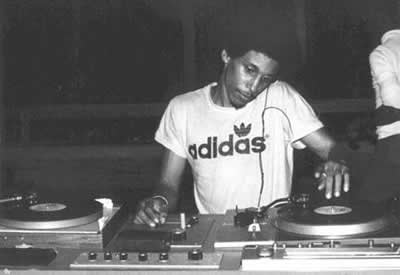
So I got really interested and went down there one time and Maboya was there. I never heard him before that day, but all I could see was this sea of people on the beach just dancing, rocking and having a good time to this mostly Caribbean music played by him. But when I looked at his equipment I was like “Wow,” this is not rocket science! So my friend Jackson and I felt if he could do this, we can do this and because Maboya was running a couple 100 feet of zip cord (18 gage wire) for power, we knew that was part of the problem why his sound didn’t sound anywhere near as good as it should.Plus he just didn’t have the right equipment for outdoors at the beach.
Troy- Damn
Plummer- So we put our money together as well as our time and sweat and we started building six and seven foot folded horn bass enclosures.
We would then go out and buy these 18 inch Cerwin Vega’s speakers from downtown Manhattan that could handle 500 watts RMS each.

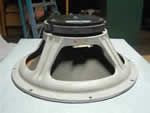
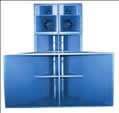
Next we would put together a rack of Phase Linear power amplifiers and then we plugged our equipment directly up to the light poles out there.
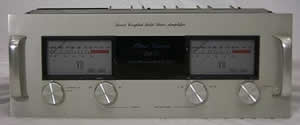
Troy- And you haven’t played a record yet?
Plummer- Your right we haven’t played a single record yet…never knew how to play a record at that time. All I knew was this guy was playing and he wasn’t mixing either.
Troy- Did he have two turntables or one?
Plummer- He had two but it was like one record would play and then he would play the next record. So when we went out there…I heard by this time the folks in the gay clubs mixing with two turntables and having a mixer. So I went out and bought myself a studio mixer that wasn’t real expensive; it was a semi professional Tascam mixer. So it had 16 channels, 8 stereo channels and an 8×8 matrixed output. It was difficult to operate for disco, but we put this stuff together and we went out there and rocked the place! All I remember the next day (Monday) was Frankie Crocker saying on the radio program that there was this guy down there at Riis Beach name Ron Plummer and that “you could hear the music coming off the bridge.” And that was where I got my name Ron Riis Beach Plummer from.
Troy- I got you.
Plummer- So from there the different promoters like Winston, M Morton Hall and Harris and Lindsay, the Dow Twins, Batch and Gordon, Frankie Assoon, etc…there were a whole number of them and they would start coming at us to book us for gigs. I remember my first gig because you always remember your first gig and it was at the Raspberry Freeze which was down in the Village right down the street from the Blue Note Club. It was in the basement and it had these little triangle mirrors on the wall. I wasn’t a professional sound engineer at the time, but I did understand much of the theory. So when we went in there, we were just too loud. We were knocking those little mirrors off the walls (Plummer is laughing) and so we learn over time. But at the same time I was still working in the store and I fortunately happened to meet the engineers who started GLI and designed the GLI mixer.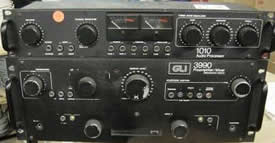
Troy- Alright Plummer hold that thought for a moment about the GLI speakers and take me back to that first day at Riis Beach and you playing those records for the very first time. What did you listen to before you became a d.j. that day on Riis Beach and this was at 21 years of age? Usually people start d.j.ing on the turntables at at least 12 or 13 years old, you starting at 21. What were you listening to before that?
Plummer- Well back then all of the folks that were out there that I knew about were older guys. Pete D.J. Jones is older than I am.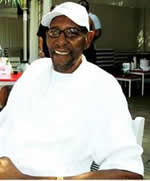
The Smith Brother and I are about the same age. QJ is about 5 or 6 years older than I am. Now again they may have started earlier but they too started in their early 20’s, maybe. First of all you have to think about it, if you are going to purchase and maintain this kind of equipment you have to have a job.
Troy- I understand that but a lot of brothers would take pieces from here and there or their family members had some money to buy them a system.
Troy- Similar to the Last Poets or something like that?
Plummer- Yeah similar to that to that kind of stuff but it wasn’t as polished as the Last Poets it was more impromptu. Gary Byrd also used to be a big radio jock, and they carried it to a different stage.
I am going to jump ahead real quick just to give you context here. When we started rapping, I think Pete was the first person I saw with someone rapping on the microphone; he had KC. KC would take the mic and he would talk over and between records hyping the crowd. It was the same year, either 72 or 73 he would talk over his mic. Then one day this guy came up to me and said he thought he could help me out in with my mixes. He said, “Because you don’t have perfect mixes every time!” But I was getting much better.
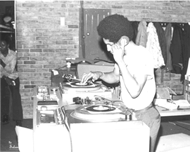
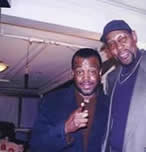
D.J. Plummer K.C Prince of Soul and Pete D.J. Jones
What also happened is I began learning about the record company circuit where you get demo records. I use to go to all the record companies and because I had a name I could go to the record companies directly and get promos. So I realized rather quickly that there was good music at the gay clubs, so I visited the gay clubs and listened to the DJs mix and that is really how I learned to mix. Then I was kind of intrigued with Grand Master Flowers because I felt he was the best mixer out on the mobile circuit and Flowers mixture of music was broad because he played rock, hustle and funk.
Troy- I am going to come back to Grand Master Flowers, take me back to Riis Beach. What came across your mind especially seeing that sea of people? Also who did you come on after or before?
Plummer- D.J. Ras Maboya was out there and I have to say I felt bad about it later on. When we turned our system on, the difference was like a night and day.
Troy- Damn you blasted him.
Plummer- Yes and the quality was unbelievable. The one thing Jackson and I agreed to after we heard Maboya and after listening to a couple of other folks, we agreed that some people had loud systems but they distorted the sound. See they would just turn their system up so loud that they would become distorted and hurt your ears. We said that we are going to make sure our sound is loud, but very clean and not distorted. We can turn it up so loud that you can walk past our bass speakers and your pants leg would ruffle but your ears would not be ringing at the end of the night!
Troy- O.K.
Plummer- We got big powerful amplifiers (700 watts RMS per channel), we didn’t skimp on them either. And I knew if you over tax those little amplifiers and go into distortion, you can also end up blowing up all your speakers that way. Now with Maboya that day it was the late afternoon 3 or 4 o’clock and we agreed to play a certain amount of time and he agreed to play a certain amount of time as well.
Troy- O.K. now Maboya went on first and you let him rock for a long time because he is Maboya and he got the crowd and no one is really expecting anything from you and Jackson because no one has heard of you guys although the crowd see’s the system looks strong.
Plummer- Everybody is coming around and looking at our equipment and wondering who the heck are these guys and what the heck is all this equipment!
Troy- And you guys have not played a record yet!
Plummer- We had not played anything yet.
Troy- So when you did turn up that system did he ever come back on again.
Plummer- I don’t remember, I just really don’t remember. I know I felt bad about it because it was such a night and day difference. But you know what Maboya was still one of the top DJs out there so it must not have deflated him that much. Maboya is Panamanian so he really had more of a Caribbean aspect to his music. That was how I learned how to mix Caribbean flavors into my repertoire. The thing about that is we kind of traded off of one another. We all learned from each other. So I came out the gate mixing, but I really didn’t know how to mix. I was mixing by gut instinct and I didn’t think I was all that good. It was more that the people were telling me that I was a good mixer. But as time went on I just learned how to mix. I catalogued my records and I would spend hours and listen to the beats and figure stuff out then I tried to mix records together that had messages in them. I started going to the record companies getting material that you never heard on the radio and I began introducing that stuff into my mix. But the difference then was it wasn’t like a got’cha type thing where you were out to kill someone. It was like friendly competition and you still competed to win. So with the Maboya situation the next day Frankie Crocker said there was this guy name Plummer out there and you can hear the music coming off the bridge!
Troy- So the Riis Beach party was like a calling card for you and your inexperience made no difference to them?
Plummer- Well you have to remember this is sort of the beginning of that era because people were not really used to the mixing at all. So, even if I made mistakes people were not used to it they were just used to people taking records and switching between them. As far as my record selection I must have played the right stuff – I intuitively played the right stuff because people were jumping. It wasn’t like I had a mission or strategy, I played what I felt was the right thing to play.
Troy- When did you get crowned D.J. of the year, who were you going against and who held this contest?
Plummer- It wasn’t like a battle. Sort of after I won, that is when the battles started.
Troy- (Troy starts laughing.)
Plummer- I remember the two battles I played in. One was at the Manhattan Center with me, Flowers, Pete D.J. Jones and the Smith Brothers. Somebody else was in there with us I just can’t remember who at the moment. So we would all play for at least an hour or so. To be honest the people that were closest to us like the groupies, they were the ones most interested in the competition. Everyone else just wanted to party.
Old School Hip Hop Interviews - DJ Plummer | OldSchoolHipHop.Com
.
.
.
In fact, there are documented "battle" (the essence of a vz) traditions in all Afram pop music going back the Ragtime era. For example
1930s Jazz


.
.
.
1960s Soul
